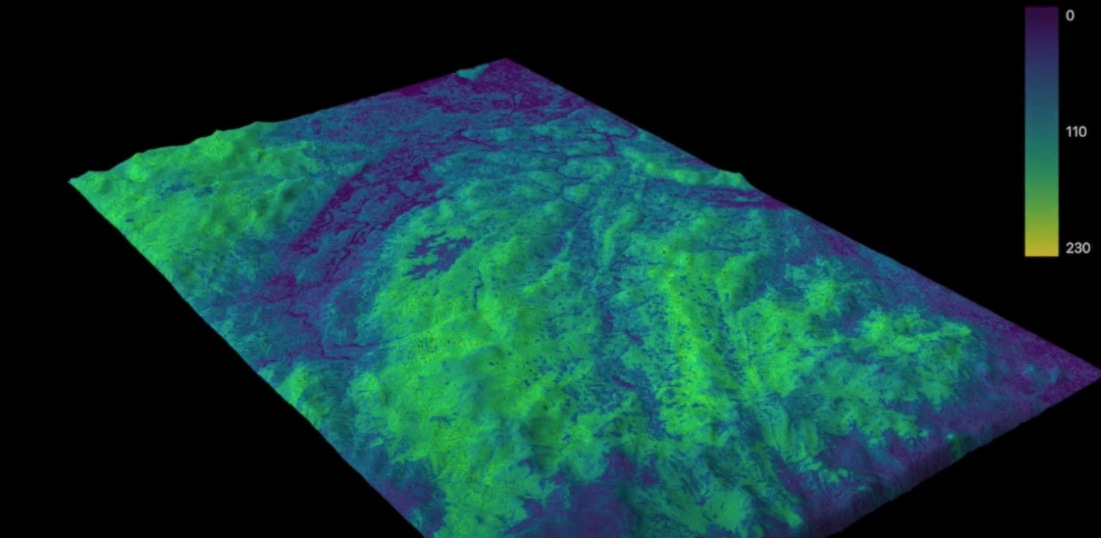Scotland’s Space Intelligence measures and maps natural capital to fight climate change
‘Natural capital is framing nature in an economic context. It is a way of measuring our natural wealth.’

By Darrell Delamaide
(Darrell Delamaide is a freelance journalist in Washington, D.C. He has specialized in business and finance over a long career, writing for Barron’s, Dow Jones, Institutional Investor, Bloomberg, and MarketWatch, among others. A longtime correspondent in Europe, Delamaide also has written about international economics, global markets, and foreign policy.)
WASHINGTON, D.C. (Callaway Climate Insights) — Murray Collins spent more than a decade tramping through tropical rainforests, mapping their expansion or contraction and measuring individual trees. He got hooked on forests during his early travels, he says, and his enthusiasm took him to field work in Indonesia, Cambodia, Gabon, Sierra Leone, and other lush climes.
Nowadays, Collins, ensconced in the relative comfort of his Edinburgh offices, employs artificial intelligence to analyze data from high-resolution satellite images of these forests, as well as other surface cover that forms the earth’s natural capital.
“It’s a lot easier,” he says with a laugh. His firm, Space Intelligence, occasionally still sends personnel into the field but more often advises local teams what to do if they need supplemental information.
“Natural capital is framing nature in an economic context,” Collins explains. “It is a way of measuring our natural wealth.”
Forests, for instance, store carbon and help regulate the atmosphere. Cutting down trees releases carbon and contributes to climate change.
Space Intelligence measures the waxing and waning of these forests and quantifies the carbon impact. It then provides off-the-shelf products to companies seeking carbon offsets for their own emissions, directing them to investments in forest preservation or restoration that yield carbon credits.
“We provide metrics for tradeable carbon,” says Collins. Space Intelligence produces maps and spreadsheets that companies can then use for nature-based solutions.
One of the services, appropriately enough for a Scottish company, is PeatMapper, tracking a resource that contains up to a third of the biosphere’s carbon locked up even though peat covers only 3% of the world’s land surface. Other services map forests, habitats, and carbon.
The timing could hardly be better for the startup, which, Collins says, is growing “very rapidly.” It now has 10 full-time staff after starting with just one a year ago, and expects to at least triple that number over the next couple of years.
The company’s next step is to help firms evaluate the impact of climate change on their assets, just as regulators worldwide are telling companies to do that in their assessment of climate risk.
The U.S. Federal Reserve, for instance, mentioned climate risk for the first time in its Financial Stability Report recently. Fed Governor Lael Brainard warned banks that supervisors would include efforts to measure and monitor climate risks in their inspections.
“We would like to expand internationally,” says Collins. “We hope to do more in the U.S. under a new administration. North America and Southeast Asia are our primary targets.”
Space Intelligence has done some mapping of the U.S. West Coast to help find ways to reduce the risk of wildfires. Once again, the focus here is on analyzing the distribution of trees. Other projects of the firm around the world range from mapping agriculture to using astronomy to track space debris.
For the moment, one of the startup’s biggest projects is for the Scottish government, mapping the country’s forests as well as other surface resources such as water and meadows. The government must now report annually on these resources as Scotland moves toward net-zero emissions. The research also signals where intervention, such as forest restoration, is needed.
Collins has an interdisciplinary doctorate from the London School of Economics and the Institute of Zoology that provided training in satellite data analytics.
“Space Intelligence has an unusual combination of expertise,” he says, in its mix of practical field experience and computer analytics skills, giving it an edge over rivals.
Ed Mitchard, the co-founder of the firm, doubles as a professor of geosciences at the University of Edinburgh. He, too, has a track record in leading field campaigns and has won more than £4 million in research funding.
Collins himself is leading the university’s Space and Satellites innovation program, a kind of incubator for research and entrepreneurs. In addition to Space Intelligence, for instance, another startup is Glasgow-based Trade in Space, which combines earth observation of agricultural commodities with trading via blockchain technology.
The university’s Bayes Centre is coordinator for data-driven space research as Edinburgh aims to become the space data capital of Europe by 2030.
In the meantime, Space Intelligence is set on rapid expansion. The company is talking to several prospects for its potential financial services, and continues to develop large tailored projects. “There are lots of new opportunities,” says Collins. “It’s very exciting.”
